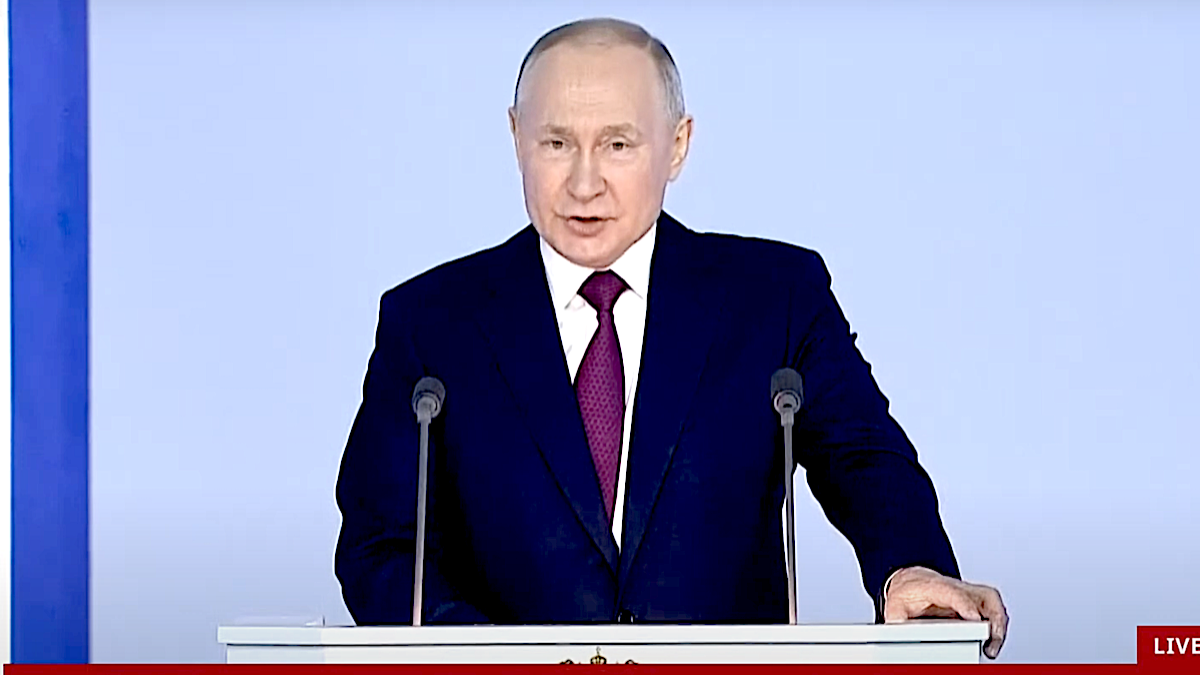Other than that Russian President Vladimir Putin declared an end to a nuclear arms treaty with the U.S. — no biggie! — you’ll probably hear precisely nothing else from the press about what he had to say Tuesday during his lengthy address. That doesn’t mean the rest of his speech was unimportant. It means the national media, for their own reasons, don’t want you to hear it.
But you should hear it because when you remove the name “Vladimir Putin” from the equation, what he said during that 100-minute address to his nation was both indisputably true and rational, even if it deflates the media’s incessant, eye-roll-worthy framing of the conflict in Ukraine as “Putin’s unprovoked war” and “a fight for democracy.” (Gag.) Here are three examples:
1. “The U.S. has used Ukraine to prepare for a large war. They have publicly admitted that.” This is, in fact, implicit if not official policy articulated by the Biden administration. The president himself declared early last year that Putin “cannot remain in power,” a threat of forced regime change if there ever was one. Biden kicked off the week by visiting the capital of Ukraine, a literal war zone with no U.S. military presence, as if to claim the conflict is as much ours as it is Ukraine’s (and it is, given that we’re footing about two-thirds of Ukraine’s defense cost).
Even Republicans in Congress are flirting with the ignition of global war. GOP Sen. Lindsey Graham of South Carolina said we should designate Russia as a state sponsor of terrorism. Senate Republican Leader Mitch McConnell has declared that the “defeat” of Russia is “the No. 1 priority for the United States right now.” (So much for lifting up America’s poor. They can wait, I guess.)
2. “The West is guilty of escalation.” Since well before Russia invaded Ukraine, Washington has promoted the expansion of new member nations to the North Atlantic Treaty Organization, or NATO, an alliance that exists in its present form for the express purpose of intimidating Russia. What started out as a warning to the Soviet Union that the U.S. would defend its European allies against military aggression is now a vanity project for both of our political parties to look like heroes by further alienating the Kremlin from the rest of the developed world.
And because Biden’s predecessor, Donald Trump, dared to ask that NATO countries pay more into the alliance, and otherwise showed no interest in expanding it for the sake of itself, that naturally led to his opponents reflexively adopting the exact opposite position: that NATO is indispensable and Ukraine is the closest thing we have to the Garden of Eden. And so, the Biden administration pushed for Ukraine’s entry into NATO, even further encircling Russia with an alliance that Putin already had every reason to fear.
3. “They [the West] want to have a strategic defeat of Russia. … It means they want to have no more, anything to do with Russia. They want to have a global resistance against Russia.” What part of that contradicts anything the Biden administration, most of Congress, and virtually every former military official on cable news has said? They all say it.
Assume that right now Russia were to retreat from Ukraine and declare a truce. Who’s going to be the first to propose that the U.S. and Europe resume regular trade and cooperation to stabilize Russia’s economy and its standing in the world? None of them will. They all expect a lasting minimizing of Russia, preferably without Putin in the picture.
Say whatever you want about Putin, he’s not irrational.









